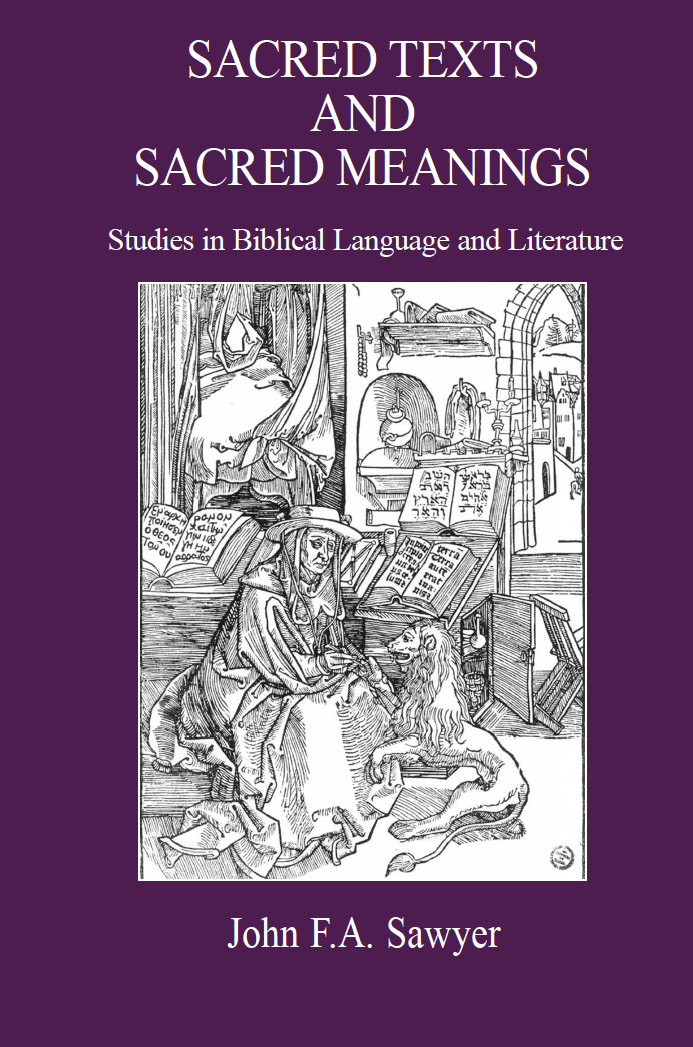Sacred Texts and Sacred Meanings: Studies in Biblical Language and Literature
Published: Jun 2011
£75.00
John Sawyer has been known for over 40 years as one of the finest British biblical scholars, always alert to new perspectives in biblical criticism and a pioneer in fruitful applications of new, often interdisciplinary, research methods. He has been an inspiring teacher to generations of students in Glasgow (1964-65), Newcastle upon Tyne (1965-94), Lancaster (1994-2002) and Oxford (2005-2008). From the very beginning he saw the need to apply sound linguistic theory to the study of the Bible, with the fundamental insight that all texts can have, and very often have had, more than one meaning.
No one meaning can claim priority over the others, he argues. The 'original meaning', more or less convincingly reconstructed by modern scholarship, can claim chronological priority, but that is all. What the text has meant to its Jewish and Christian readers down the centuries should be as much the subject of scholarly attention as any 'original' meaning. This is the unifying strand in the whole of his work, from his groundbreaking Semantics in Biblical Research: New Methods of Defining Hebrew Words for Salvation (1972) and his From Moses to Patmos: New Perspectives in Old Testament Study (1977) to his fascinating The Fifth Gospel: Isaiah in the History of Christianity (1996) and his Sacred Languages and Sacred Texts (1999). Among his most recent major contributions in this area have been his co-editorship of the Blackwell Bible Commentary Series, his edited Blackwell Companion to the Bible and Culture (2006) and his own Concise Dictionary of the Bible and its Reception (2009).
In 2011 John Sawyer has been elected President of the Society for Old Testament Study, and to celebrate that appointment Sheffield Phoenix Press is honoured to present this representative selection of 46 of his papers, some previously unpublished and some originally published in rather obscure places.
Sacred Texts and Sacred Meanings: Studies in Biblical Language and Literature
£75.00
John Sawyer has been known for over 40 years as one of the finest British biblical scholars, always alert to new perspectives in biblical criticism and a pioneer in fruitful applications of new, often interdisciplinary, research methods. He has been an inspiring teacher to generations of students in Glasgow (1964-65), Newcastle upon Tyne (1965-94), Lancaster (1994-2002) and Oxford (2005-2008). From the very beginning he saw the need to apply sound linguistic theory to the study of the Bible, with the fundamental insight that all texts can have, and very often have had, more than one meaning.
No one meaning can claim priority over the others, he argues. The 'original meaning', more or less convincingly reconstructed by modern scholarship, can claim chronological priority, but that is all. What the text has meant to its Jewish and Christian readers down the centuries should be as much the subject of scholarly attention as any 'original' meaning. This is the unifying strand in the whole of his work, from his groundbreaking Semantics in Biblical Research: New Methods of Defining Hebrew Words for Salvation (1972) and his From Moses to Patmos: New Perspectives in Old Testament Study (1977) to his fascinating The Fifth Gospel: Isaiah in the History of Christianity (1996) and his Sacred Languages and Sacred Texts (1999). Among his most recent major contributions in this area have been his co-editorship of the Blackwell Bible Commentary Series, his edited Blackwell Companion to the Bible and Culture (2006) and his own Concise Dictionary of the Bible and its Reception (2009).
In 2011 John Sawyer has been elected President of the Society for Old Testament Study, and to celebrate that appointment Sheffield Phoenix Press is honoured to present this representative selection of 46 of his papers, some previously unpublished and some originally published in rather obscure places.
Empire and Apocalypse: Postcolonialism and the New Testament
Published: Oct 2006
Price range: £18.50 through £37.00
In Empire and Apocalypse Stephen Moore offers us the most complete introduction yet to the emergent field of postcolonial biblical criticism. It includes an indispensable in-depth introduction to postcolonial theory and criticism together with a detailed survey of postcolonial biblical criticism.
Next come three substantial exegetical chapters on the Gospels of Mark and John and the Book of Revelation, which together demonstrate how postcolonial studies provide fresh conceptual resources and critical strategies for rethinking early Christianity's complex relations to the Roman Empire. Each of these three texts, to different degrees, Moore argues, mimic and replicate fundamental facets of Roman imperial ideology even while resisting and eroding it.
The book concludes with an amply annotated bibliography whose main section provides a comprehensive listing of work done to date in postcolonial biblical criticism.
Empire and Apocalypse: Postcolonialism and the New Testament
Price range: £18.50 through £37.00
In Empire and Apocalypse Stephen Moore offers us the most complete introduction yet to the emergent field of postcolonial biblical criticism. It includes an indispensable in-depth introduction to postcolonial theory and criticism together with a detailed survey of postcolonial biblical criticism.
Next come three substantial exegetical chapters on the Gospels of Mark and John and the Book of Revelation, which together demonstrate how postcolonial studies provide fresh conceptual resources and critical strategies for rethinking early Christianity's complex relations to the Roman Empire. Each of these three texts, to different degrees, Moore argues, mimic and replicate fundamental facets of Roman imperial ideology even while resisting and eroding it.
The book concludes with an amply annotated bibliography whose main section provides a comprehensive listing of work done to date in postcolonial biblical criticism.


